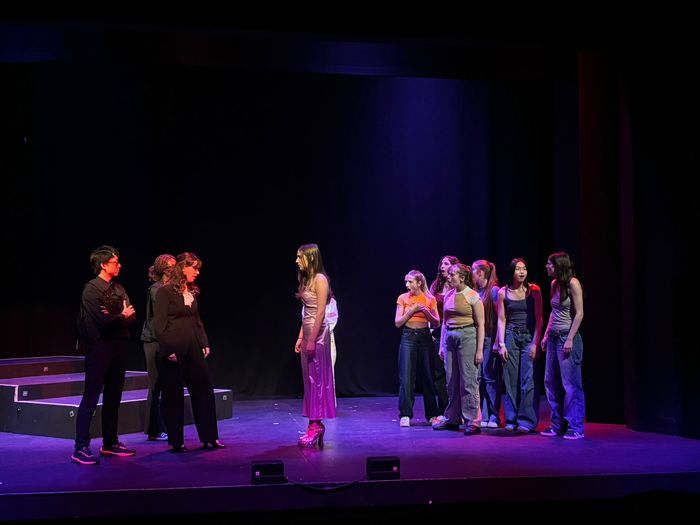pool (no water) is eerily powerful
Josh Pritchard was totally engrossed by this darkly twisted ensemble piece

There is an eeriness to pool (no water) that not many other plays achieve. From the haunting and, at times, graphic subject matter the play tackles to the moments of quiet spectacle which emerges from the play’s minimalist set, the whole piece is riddled with unsettling imagery, dialogue and subtext. And yet, as I sat there, tucked away in a tiny corner of the Corpus Playroom, I could not believe how enraptured I was.
The play follows four female artists, who refer to themselves as ‘The Group.’ We do not hear any of their names, nor hear them speaking without the others listening. As is stated near the play’s beginning, “we are the Group and there is balance.” This harmony begins to unravel when a fellow artist, who is herself achieving stardom, suffers a horrific injury, and ‘The Group’ start to wonder if they can utilise this to benefit their own careers. Spoilers aside: this is not a play for the squeamish, but it is one that inspires a lot of conversation. Mark Ravenhill’s script is a provocative one, yet it raises some great points over the graphicness art can descend into, and the dangers it can pose as an outlet for rage, sadism and manipulation.
“This is not a play for the squeamish, but it is one that inspires a lot of conversation”
The Group are undoubtedly horrific people. There did come a point where I started to wonder if we would see more development for them beyond their obsessions with the macabre but, as the story progressed, this concern slowly dissipated. As with any text that depicts morally depraved characters, your allegiance to them is warped – there is some catharsis at seeing their downfalls, but, in this instance, there is also sympathy for their pain and suffering. There are extensive references to drug misuse, for example, and considering the documented suffering endured by modern artists, there is a horror created at how close some of the actions in the play are to reality.
There is another horror at the heart of this play, and it is one that university students may relate to more – the willingness of the individual to diminish their own identity, and become synonymous with ‘the group.’ This aspect is, partially, what drove me to scrutinise almost every single line which emerged. Pay close attention to both pronouns and positioning in this play. Each of the four characters’ individuality is established so subtly that it’s almost imperceptible, but once you notice it, it is impossible to ignore. In a play where both script and direction demand its characters’ symbiosis, any speck of individuality quickly becomes the centre of attention.
“Each character’s individuality is established so subtly that it’s almost imperceptible”
The play’s distinguishing feature is undoubtedly its ensemble work – the four actors are on stage for the play’s duration, moving simultaneously to enact scenes without relying on transitions or set changes. It’s a theatrical feature that is quite hard to execute without seeming amateurish, yet this was never a concern for me whilst I was watching – I would actually argue the ensemble work is the most engrossing part of the play to watch. There are some monologues, and whilst their quality of delivery is occasionally inconsistent, they never threaten to break the immersion the play so masterfully creates throughout its 55-minute runtime.
A play like this is tremendously difficult to direct and Jacob Coughlan has done a marvellous job. If Camdram is to be believed, and this is his first (!) directing role, then get him back in the chair tomorrow. The intelligent cast he has assembled are all equally brilliant. It’s nearly impossible to single out Elena Cormican, Abi Beton, Em Sparkes, or Izzy Lane for their individual performances, as each complements the others so effectively that their strength would be entirely diminished if any one stood out above the others. Credit as well goes to the choice of the Corpus Playroom for the play’s venue, as the minimalist set is certainly better suited for the Playroom’s more intimate space than they would be under the garish spotlights of the ADC.
A play as sinister as pool (no water) has to balance its intelligent ideas with its bloody material in order to avoid falling into graphic overindulgence. This is something it excels at wonderfully, creating a piece that feels like it demands not only your attention, but repeat viewing. This is an exceptional play that, despite its horrific content, ensures you cannot turn your eyes away.
‘pool (no water)’ is showing at the Corpus Playroom from Tuesday 25th until Saturday 30th November, at 7pm.
 Comment / Cambridge’s tourism risks commodifying students18 April 2025
Comment / Cambridge’s tourism risks commodifying students18 April 2025 News / Varsity ChatGPT survey17 April 2025
News / Varsity ChatGPT survey17 April 2025 News / Cambridge researchers build tool to predict cancer treatment success19 April 2025
News / Cambridge researchers build tool to predict cancer treatment success19 April 2025 News / Cambridge researchers find ‘strongest evidence yet’ of life on distant exoplanet18 April 2025
News / Cambridge researchers find ‘strongest evidence yet’ of life on distant exoplanet18 April 2025 News / Greenwich House occupiers miss deadline to respond to University legal action15 April 2025
News / Greenwich House occupiers miss deadline to respond to University legal action15 April 2025






